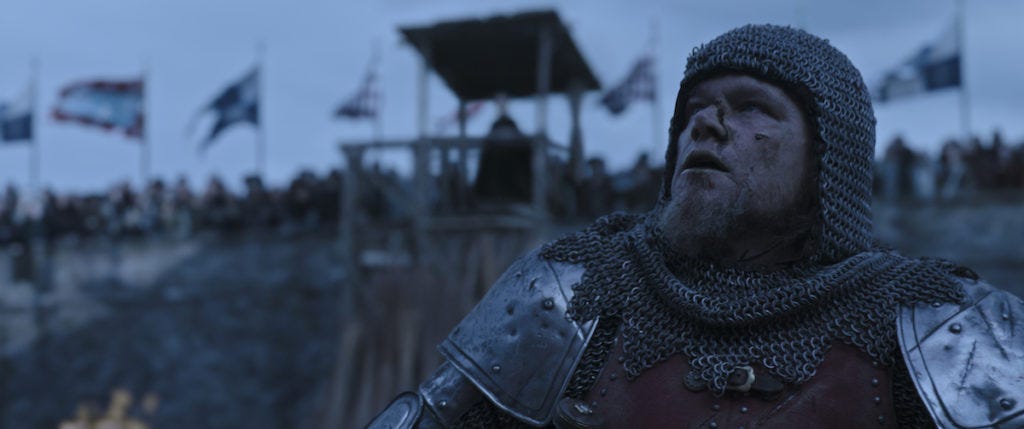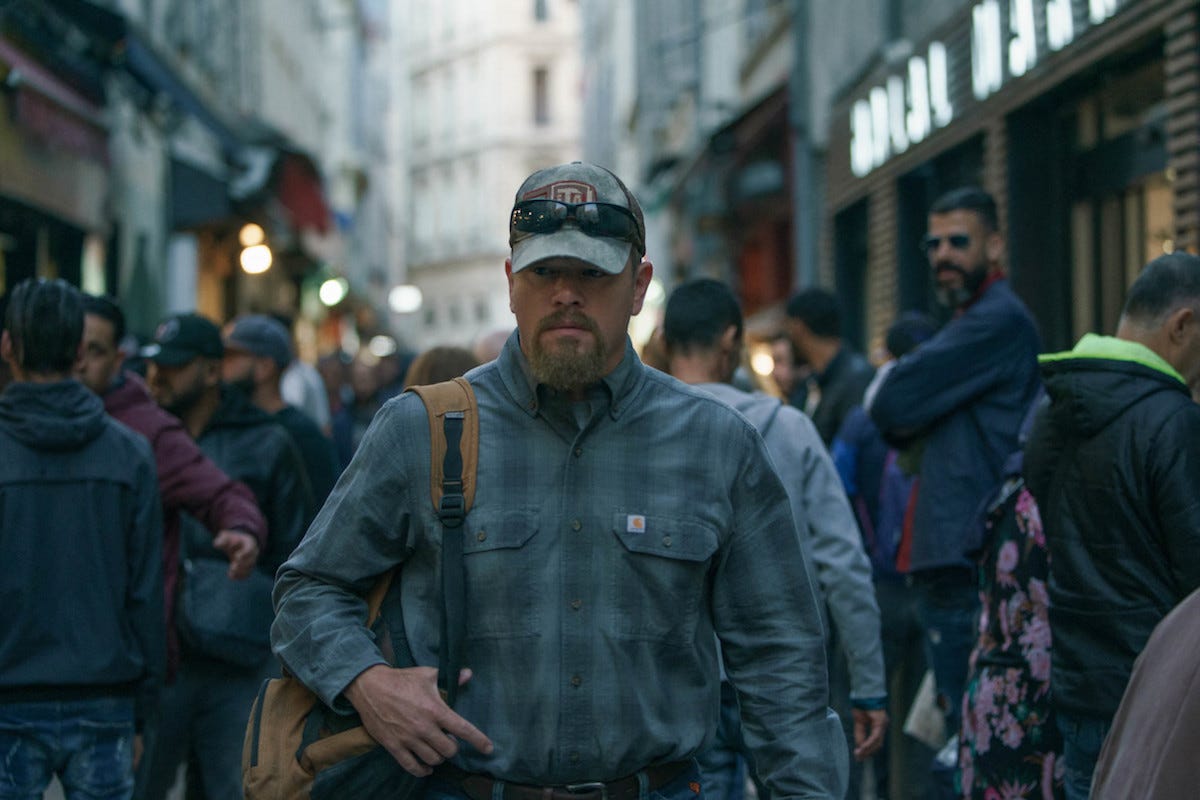Matt Damon has starred in two movies this year. Both were set in France, albeit in very different eras. Both involved protagonists out of their depth, unsuited for navigating situations they didn’t quite understand. And both featured Damon as a guy trying to figure out how to be a man in a shifting world.
Stillwater, released this summer, features Damon as Bill Baker, a roughneck scrounging for work whose daughter, Allison (Abigail Breslin), is five years into a nine-year prison sentence in France for the murder of her girlfriend. Abigail insists she’s innocent and claims to have a new lead that will prove it; Bill, who had come for a visit, decides to stick around the French seaside city of Marseilles to help her in her efforts.
Except Abigail doesn’t really want Bill’s help, as she makes clear in a letter to her French attorney. “You know my father,” she writes in French, a language he has not bothered trying to learn despite the girl’s predicament. “I cannot trust him with this. He is not capable.” As Bill willingly admits to Virginie (Camille Cottin), a local who helps translate for him, he is something of a screwup, having been addicted to drugs and drink in his younger years. He doesn’t blame Allison for not wanting his help. But he’s determined to offer it nevertheless, with potentially dire results.
The portrayal of Bill by Damon as guided by writer/director Tom McCarthy edges up toward the stereotypical, from his choice of lodging (Best Western) to the highlights of his cuisine (Subway while out; pan-fried hamburgers while in) to the gruntingly dismissive way with which he treats French sports and language alike. As he lives in Marseilles and as he grows closer to Virginie and her daughter, Maya (Lilou Siauvaud), Bill shows himself open to new experiences (he’s willing to attend some French absurdist theater!) even if he doesn’t quite grok what he’s seeing (don’t ask him to explain what’s good or bad about it).
There’s something charmingly stubborn about Bill Baker, even when that stubbornness gets him in over his head. There’s something innately American about him, the way he hides behind his ballcap and his Oakleys, the matter-of-fact taciturnity that defines so many of his interactions with people he seems sure are mocking him just out of reach.
Note: There will be some discussion of The Last Duel, including the victor of said duel, after the jump.

A sensation of mockery and disrespect also animate Sir Jean de Carrouges, the character Damon plays in The Last Duel. Let’s be clear: De Carrouges is not an American; America is still some centuries from being founded when The Last Duel begins. But he is very much a man, and The Last Duel is a film very concerned with the obstinacy of men in the face of disrespect.
Told in three parts—first from the perspective of de Carrouges, then from the perspective of Jacques Le Gris (Adam Driver), and finally from the perspective of Marguerite de Carrouges (Jodie Comer)—The Last Duel is about the sexual assault of Marguerite by Le Gris and the ways in which the stories we tell ourselves about ourselves do not necessarily line up with reality.
And while the primary focus is on that assault and how the two parties to it perceived it (Le Gris as a sort of sexual game; Marguerite as rape), a secondary issue at play is how the attack influences Jean de Carrouges and how he believes himself to be seen by the French nobles under whom he serves. Jean sees himself as both heroic, saving Jacques’s life in battle, and also underappreciated, the subject of mockery and scorn from Count Pierre d’Alençon (Ben Affleck). He remembers himself as cheated out of land promised to him while marrying Marguerite; he remembers himself practically on death’s doorstep from sickness when he returns from battle.
Though Jean is undoubtedly a figure of fun for the likes of Pierre—de Carrouges can neither read nor write and has no knowledge of the decadent sexual games that pass for sophistication at the count’s court—the other particulars are remembered … differently. That battle at which he saved Jacques’s life? Jacques was only in danger because Jean disobeyed orders, impetuously storming an enemy position in a way that weakened his own. That death rattle he has when coming back from battle? A mere sniffle by light of his wife. That land he feels cheated out of? It was never his, he was informed it would not be his, and his recourse to the courts was doomed not only to fail but to alienate him from the court of King Charles VI.
Like all men, Jean sees himself as the hero of his own story: decent, hardworking, and unfairly wronged. And yet, he earns no cheers for his work, no plaudits. He is mocked; he is slighted. Damon bears all this with an increasing rage, his eyes narrowing to slits, the veins in his forehead practically protruding under the medieval mullet that surrounds it. It is not until he wins the duel, salvaging his honor and saving the life of his wife that the cheers rain down upon him.
Ridley Scott composes a striking shot near film’s end: Jean and Marguerite are each on horseback, their steeds walking out of the stadium in which the duel has been fought. Jean is bloodied and weary, but as the applause reaches a fevered pitch he finally smiles, haltingly at first and then at full beam. Finally: the respect he feels he’s due this whole time! Marguerite, meanwhile, looks on, ruefully. Her life was on the line just as much as his—were he to lose, she would’ve been burned alive at the stake—but in this moment it is clear to her, and to all of us, that her life and her pride were very much a secondary concern for Jean.
And it is here where Damon truly shines, that almost-boyish grin calling to mind at once both the wounded pride of Will Hunting and the angry swagger of Jason Bourne. There’s a collection of masculine ideals smashing against one another in that one shot, a key to the sickness at the heart of The Last Duel’s story.
And a clue to what the talented Mr. Damon has been doing for much of his movie career.





